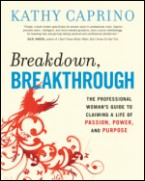Are Midcareer Female Attorneys in Crisis?

Corporate midcareer women are in big trouble, and that includes female attorneys, says a career and life coach who specializes in women’s empowerment issues.
“After devoting years to building successful careers, most of them feel that their professional lives and identities no longer work,” says Kathy Caprino, author of the recently published book “Breakdown, Breakthrough: The Professional Woman’s Guide to Claiming a Life of Passion, Power and Purpose.”
In her book, Caprino identifies 12 crises that corporate midcareer women face, including work-life balance failures, bad or intolerable treatment at work, and a fearfulness to speak up without being rejected or punished. These issues “absolutely apply” to women in the legal profession as well, Caprino says.
Careful not to blame their male counterparts, Caprino says many female professionals are dominated at work by generally white-male competitive career models that emphasize linear career paths and the assumption that top-performing women are motivated most by money and power.
Nicole Nehama Auerbach, who founded a Chicago-based organization called the Coalition of Women’s Initiatives in Law Firms, agrees with Caprino and says her research is especially relevant in the legal industry.
Women often bring intangibles to the firm such as nurturing business and a knack for making client teams work, Auerbach says. And these qualities are difficult to quantify compared to billing hours in a profit-driven world.
“I think a lot of the issues she seizes upon would never be issues men would point to as a reason for not succeeding,” Auerbach says. “Traditionally, women are not as vocal about getting what they want; women were previously conditioned not to complain. That’s very different from the way a lot of men were raised.”
According to Caprino, female attorneys are also dis-empowered in ways that men are not, such as limited access to same-gender role models and the fact that women are still responsible for 75 percent of domestic responsibilities, even if they have full-time careers.
A dearth of female equity partners, and thereby fewer high-level female mentors, is a reality separating the women from the men in law firms.
“The big question is ‘why are they not staying?’” asks Auerbach, who left Katten Muchin Rosenman to co-found Valorem Law Group in April 2008 after 14 years in practice. “Statistically there should be plenty of women at every level,” Auerbach points out, noting that women comprise 50 percent or more of many first-year associate classes, “but they are dropping out.”
Additionally, while embracing a ‘good enough’ attitude is sound advice for female lawyers struggling to balance work and private life, Auerbach says the reality is often more difficult for attorneys who want to give the best to every client.
Women raising families often find that you cannot do every single thing in the most perfect way always, Auerbach says. However, “I would hate to tell a client, I’ve given you good enough.”



